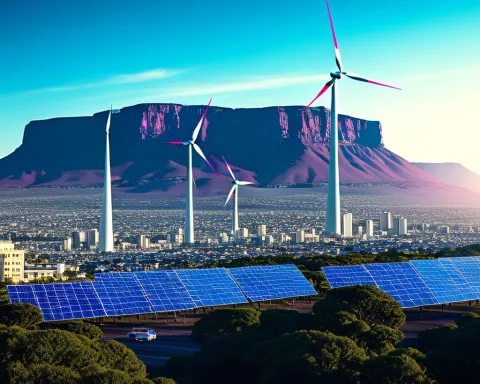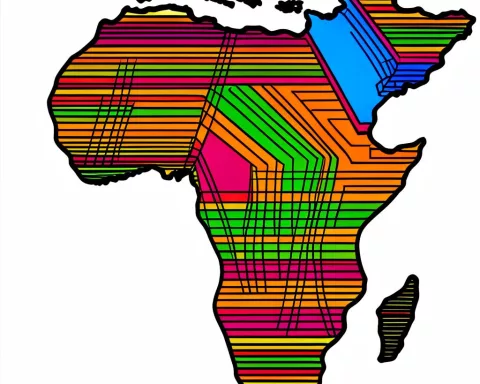Premier Alan Winde played a key role in Climate Week, representing Africa as co-chair of the Under 2 Coalition in New York. His focus is on working together to fight climate change and helping communities adapt to its impacts, all while sticking to the Western Cape’s Vision 2050 for a better future. At the same time, Cape Town is hosting its own Climate Week, echoing the global discussions and highlighting local efforts to tackle climate issues. Both events show how important it is to work together, bringing global and local voices together to create a sustainable and fair world for everyone.
What is Premier Alan Winde’s role in climate action during Climate Week?
Premier Alan Winde’s participation in Climate Week involves representing Africa as co-chair of the Under 2 Coalition. His focus is on promoting climate action through collaboration, emphasizing adaptation and mitigation strategies while aligning with the Western Cape’s Vision 2050 for sustainable development and community resilience.
Global Climate Discourse and Premier Winde’s Role
From September 22 to 29, Premier Alan Winde’s involvement in New York Climate Week marks a significant juncture in the global conversation on climate change. This annual event attracts a diverse array of speakers who address the pressing need for structural changes to tackle climate vulnerabilities and the associated social and political inequalities.
Winde’s new position as Africa’s co-chair for the Under 2 Coalition of global subnational governments represents a major advancement for the continent. His participation is focused on promoting climate action through enhanced cooperation across all governmental levels, emphasizing both adaptation and mitigation strategies. This focus aligns with the Western Cape Government’s commitment to reducing climate vulnerabilities and boosting the resilience of communities, the environment, and the regional economy.
The Western Cape Climate Change Implementation Plan: Vision 2050 outlines a comprehensive strategy for addressing climate change. This plan underscores that climate change is a universal challenge demanding collective effort. Resource resilience and climate adaptation are central to the current provincial strategic planning and budgeting processes, emphasizing a collaborative and holistic approach to climate action.
Cape Town Climate Week: A Local Reflection of Global Themes
While Premier Winde elevates African climate concerns on the international stage in New York, the African Climate Alliance and key civil society stakeholders are organizing the third Cape Town Climate Week from September 23 to 28. This event mirrors the themes discussed in New York, highlighting the interconnectedness of global and local climate initiatives.
The Department of Environmental Affairs and Development Planning is keenly anticipating the discussions during Cape Town Climate Week 2024. It encourages all stakeholders to actively participate in these collaborative efforts to achieve a climate-resilient and equitable future. This initiative is in alignment with the Western Cape Climate Change Response Strategy and Implementation Plan: Vision 2050, which advocates for environmental sustainability and social equity. By focusing on systemic solutions, the plan aims to strengthen community resilience and advance the province’s vision of a just, sustainable future.
Minister Anton Bredell’s comments following the President’s signing of the Climate Change Act resonate with the goals of Cape Town Climate Week. “Our province is dedicated to making sure that vulnerable communities are not sidelined during this transition. We prioritize equitable access to resources, education, and opportunities, empowering all residents to engage actively in climate action,” Bredell affirms.
Bridging Global and Local Climate Efforts
These dual narratives of global and local climate initiatives paint a broader picture of concerted efforts to tackle the climate crisis. Premier Winde’s engagement in New York serves as a bridge between Africa and the international community, fostering a collaborative approach to climate resilience. Concurrently, Cape Town Climate Week acts as a microcosm of this global endeavor, emphasizing the critical role of local actions in the overarching framework of climate change mitigation.
The narrative of climate action in the Western Cape is characterized by proactive engagement and strategic foresight. Vision 2050 is more than just a document; it is a living strategy that adapts to emerging challenges and opportunities. It highlights the necessity of systemic change, recognizing that piecemeal approaches are inadequate to address the complex, interconnected nature of climate vulnerabilities.
Historical and artistic movements have often mirrored society’s response to existential threats. Just as the Romantic movement of the 19th century emerged in reaction to the Industrial Revolution’s environmental degradation, today’s climate initiatives can be seen as a new form of societal reflection and action. They represent a collective acknowledgment of the need to harmonize human progress with environmental stewardship.
A Holistic Approach to Climate Action
In this light, the Western Cape’s strategic initiatives are reminiscent of the principles of the Arts and Crafts movement, which championed sustainability and quality of life amidst industrialization. Similarly, the Western Cape’s Vision 2050 plan promotes sustainable development, striving to balance economic growth with environmental health and social equity.
The role of civil society in these initiatives cannot be overstated. Grassroots movements and local organizations are crucial in fostering a culture of sustainability and resilience. Their involvement in events like Cape Town Climate Week magnifies their impact, creating a ripple effect that extends beyond the immediate community.
The interconnectedness of these efforts highlights a broader understanding of the climate crisis as a multifaceted challenge. It is not solely an environmental issue but a complex web of social, economic, and political factors. Addressing it requires a comprehensive approach that integrates diverse perspectives and expertise.
In summary, Premier Alan Winde’s participation in New York Climate Week, alongside the concurrent Cape Town Climate Week, signifies important milestones in the global and local climate action narrative. These events underscore the critical need for structural change and collective effort in addressing the climate crisis. The Western Cape’s Vision 2050 plan serves as a blueprint for sustainable development, emphasizing the importance of resilience, equity, and systemic solutions. Through these concerted efforts, the vision of a more sustainable and equitable future becomes an achievable goal.
FAQ on Premier Alan Winde’s Participation in Climate Week
What was Premier Alan Winde’s role during Climate Week in New York?
Premier Alan Winde served as Africa’s co-chair of the Under 2 Coalition during Climate Week in New York. His involvement focused on promoting climate action through collaboration, emphasizing adaptation and mitigation strategies aligned with the Western Cape’s Vision 2050 for sustainable development and community resilience.
Why is the Under 2 Coalition significant?
The Under 2 Coalition is a coalition of subnational governments committed to reducing greenhouse gas emissions and addressing climate change. Premier Winde’s role as co-chair enhances Africa’s representation in global climate discussions and promotes a united effort among various levels of government to tackle climate vulnerabilities and inequalities.
What is the Western Cape Climate Change Implementation Plan: Vision 2050?
The Western Cape Climate Change Implementation Plan: Vision 2050 is a comprehensive strategy aimed at addressing climate change challenges in the Western Cape. It emphasizes resource resilience and climate adaptation as central to provincial strategic planning and budgeting, promoting a collaborative approach to climate action.
How does Cape Town Climate Week relate to global climate discussions?
Cape Town Climate Week, organized by the African Climate Alliance and civil society stakeholders, echoes the themes discussed at Climate Week in New York. It highlights the interconnectedness of global and local climate initiatives, emphasizing the importance of collaborative efforts to achieve climate resilience and equity.
What are the goals of Cape Town Climate Week?
Cape Town Climate Week aims to foster discussions among stakeholders about achieving a climate-resilient and equitable future. It aligns with the Western Cape Climate Change Response Strategy and Implementation Plan: Vision 2050, promoting environmental sustainability, social equity, and systemic solutions to climate challenges.
How can individuals and communities participate in climate action?
Individuals and communities can engage in climate action by participating in local initiatives like Cape Town Climate Week, supporting grassroots movements, and advocating for sustainable practices. Empowering vulnerable communities and ensuring equitable access to resources and opportunities is crucial for collective climate resilience, as emphasized by Minister Anton Bredell.












